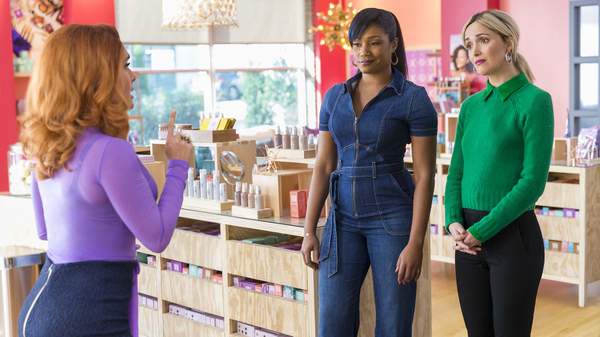Overview
Comedies about women kicking ass in the workplace — overcoming sexism, ageism and other barriers, and generally demonstrating their business savvy — comprise a tiny genre. Based on its most recent additions, you can be forgiven for wishing it was even smaller. Where the smart and amusing 9 to 5 once sent three tenacious ladies on a quest for revenge against their misogynist boss, its latest successors all serve up easy, lazy tales paired with muddled messages. Exhibit A: the beauty industry-set I Feel Pretty, which judged as much as championed the allegedly average-looking Amy Schumer. Exhibit B: Second Act, where Jennifer Lopez plays a working-class manager determined to show her worth beyond her modest background, but only after lying to land a lucrative makeup company job. Exhibit C: newcomer Like a Boss, where women running their own cosmetics businesses are too busy acting petty and irrational to make sensible or even just realistic decisions.
If you've noticed a similarity between the last three films, yes, they're all set in makeup companies. That's another reason this current breed of ostensibly empowerment-driven movies belongs in the bin. Hollywood might think it's using a field known for focusing on appearances to celebrate the opposite idea — that it's what's inside that counts — but it's really just making vapid, superficial and unfunny films that insult women's intelligence. No one needs a thematically linked cinematic universe about ladies who work in cosmetics and learn their real inner worth. Cinema chains might want one so they can host 'chicks at the flicks' sessions, hand out makeup samples and charge more for tickets, but audiences can grasp the underlying message without the beauty-driven angle. And yet, these movies keep coming. Worse: they keep insisting that the packaging does actually count, arrogantly assuming that no one would glean their purported wisdom if it wasn't juxtaposed against the cosmetics world.
As an opening montage of Mia (Tiffany Haddish) and Mel's (Rose Byrne) 22-year friendship shows, Like a Boss' protagonists have always dreamed of working in the beauty industry. With their own makeup store and top-selling cosmetics kit, they've made that childhood wish come true. The duo also party and live together, to the point that they brush their teeth simultaneously while swapping Barack Obama fantasies — but, with Mia creative and pushy and Mel meek and practical, their business is in financial trouble. Conveniently, in swoops mogul Claire Luna (Salma Hayek) with an offer to bail them out. Requiring a considerable stake in the company in return, she secretly wants to steal their business for herself.
Cartoonish from the moment her carrot-hued hair sweeps into frame — "my head is not little; it's just that my breasts are humongous," she snaps — Hayek's villain says much about Like a Boss. She's the titular figure suddenly ordering Mia and Mel around and pitting them against each other, and she fits every inane stereotype there is about women breaking the glass ceiling. Ruthless, catty and erratic, she plots evil schemes while balancing on towering heels and wearing tight dresses, with the film making fun of her appearance, her ambition and — in a painfully prolonged scene — her accent. It's grating to watch, and it typifies how contemptuously Like a Boss treats its characters.
Indeed, add squandering a great cast to the film's many missteps. Despite the visible efforts of Haddish and Byrne, their central pair remains just as paper-thin. The usually reliable comedic actors work hard, but choking energetically and hurling over-the-top insults aren't the same as depicting fleshed-out people — and, when their characters aren't being belittled by Claire, they're being criticised by their wider circle of friends (Ari Graynor, Jessica St Clair and Natasha Rothwell) about their life choices. As for other supporting players Jennifer Coolidge (American Pie), Billy Porter (an Emmy winner for Pose) and Karan Soni (Miracle Workers), they're only asked to serve one comic purpose each. The ditzy employee who blurts out inappropriate things, the sassy gay man who tells it like it is and the compliant minion — they're all accounted for.
Given the movie's premise and script, none of its performers ever stood much of a chance. It's hard to understand what first-time feature writers Sam Pitman and Adam Cole-Kelly are trying to achieve — although their pitch was bought as a Bridesmaids-style vehicle for Haddish after Girls Trip became a hit, so perhaps everyone simply thought she'd carry the feature. It's hard to see what filmmaker Miguel Arteta saw in the project either, or brings to it for that matter. When he directed Hayek in 2017's Beatriz at Dinner, the result was a dark and scathing exploration of class differences in America's current political climate. With Like a Boss, however, he just serves up broad laughs about women working, competing and acting like clichés.
Even when the film tries to evoke blunt guffaws about a very relatable idea — that even the most successful ladies don't always have it together — it still proves weak and unconvincing. In fact, those aspects of the story feel clumsily tacked-on. Like its recent predecessors, this mess of a supposed comedy only achieves one feat: contradicting itself. No matter how forcefully Like a Boss pushes the 'it's what's inside that matters' mantra, every element of this superficial movie sadly screams the exact opposite.
